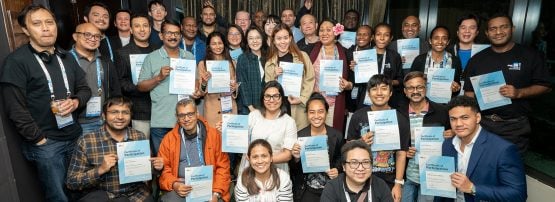
Every year, APNIC offers fellowships to professionals and youth in Asia Pacific’s developing or small island economies. Successful fellowship applicants follow a structured training program, culminating in sponsored participation in an APNIC conference. We’ll be sharing the stories of APNIC fellowship alumni in an ongoing series here on the APNIC Blog.
This year, I was an APNIC Fellow in the youth category and attended APNIC 58 in Wellington, New Zealand. This post is about my experience as an APNIC Fellow and how I will apply knowledge gained to strengthen WebSafe Samoa’s (my employer) cybersecurity for the benefit of my community in Samoa.
What I learned during the APNIC fellowship
Being an APNIC Fellow was a transformative experience that not only deepened my professional skills but also sparked a new passion for community engagement in cybersecurity. I came away with a much more detailed understanding of network security and am excited to implement what I’ve learned, both at WebSafe Samoa and through a community initiative I’ve started.
Network, device, and infrastructure security
One of the most important aspects I learned during the APNIC fellowship was the importance of securing network devices and infrastructure. While I had some understanding of this before, the fellowship gave me deeper experience in the intricacies of firewall management, intrusion prevention, and encryption. I now know how to configure and manage firewalls to safeguard vital systems and how to use Intrusion Prevention Systems (IPS) to mitigate threats before they escalate. Learning more advanced encryption techniques has also equipped me to secure communication channels.
Intrusion detection and DDoS countermeasures
Another major focus during the fellowship was intrusion detection and Distributed Denial of Service (DDoS) countermeasures. I learned how to set up and monitor Intrusion Detection Systems (IDS) to spot network traffic that could indicate an attack. I now feel prepared to implement proactive defence strategies to combat DDoS attacks. I’ve also gained hands-on experience with real-time threat management tools, which will be important when handling cyber threats as they arise.
BGP hijack prevention and secure Internet routing
Border Gateway Protocol (BGP), which is responsible for Internet routing, has some vulnerabilities that can be exploited to hijack routes and divert traffic, causing major disruptions or allowing data theft. The sessions on securing BGP routes taught me how to better protect traffic from being hijacked, and I learned how to use tools to detect and prevent BGP route leaks and manipulations to ensure the integrity of Internet traffic.
Applying learnings to my work and in my community
After gaining all this professional development, I’m excited to implement them at WebSafe Samoa. My immediate goals are to strengthen our firewall policies, improve our IDS, and roll out strategies to mitigate DDoS attacks.
I also plan to upgrade our monitoring capabilities, using more advanced log management and flow monitoring tools so we can respond faster to potential threats. These upgrades will significantly enhance the security of our infrastructure and ensure we’re better protected against cyberattacks.
Beyond my work with WebSafe Samoa, I’ve also been inspired to engage the community with this knowledge. I have already proposed the creation of the YouthTrack Cybersecurity Campaign to the Samoa Cybersecurity Hub.
This campaign aims to raise awareness about cybersecurity threats, especially among younger people. I want to help equip the next generation with the tools and knowledge they need to protect themselves and others online. The project will offer hands-on training in cybersecurity, helping to create a safer digital environment for everyone in Samoa. It’s exciting to think that this project could have a long-lasting impact on the economy’s overall cybersecurity posture.
Staying engaged with APNIC
The experience I’ve gained from the 2024 APNIC fellowship has been invaluable but my journey in cybersecurity is far from complete. I plan to continue building on what I’ve learned as an active APNIC Member. APNIC membership gives me access to training and resources that will continue to strengthen my knowledge. Being part of the APNIC community will enable me to network with other professionals in the field and exchange ideas to continue developing the YouthTrack Cybersecurity Campaign and help improve regional cybersecurity.
Learn more about APNIC fellowships, APNIC membership, and the APNIC Academy.
Ulafala Viliamu is a Security Analyst in the Cybersecurity and ICT Services department of WebSafe Samoa and an APNIC 2024 Fellow.
The views expressed by the authors of this blog are their own and do not necessarily reflect the views of APNIC. Please note a Code of Conduct applies to this blog.

Well Done Ula , Wonderful to see you building those need skills for our Pacific people